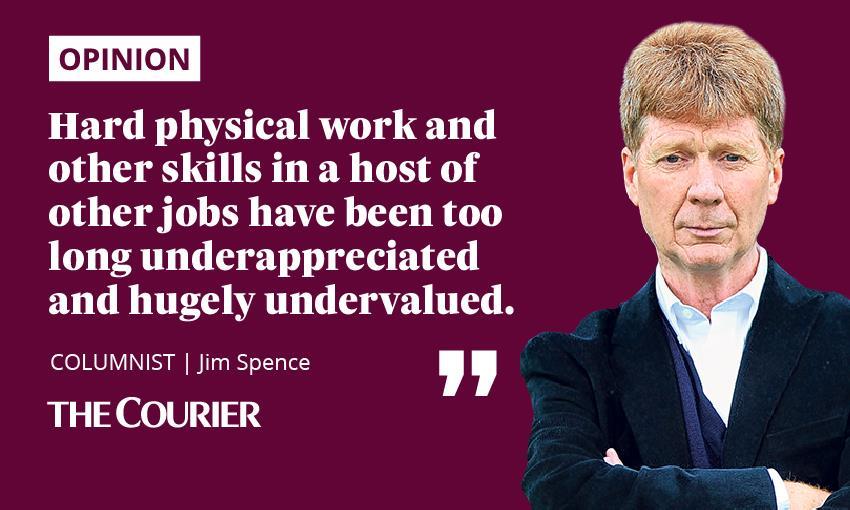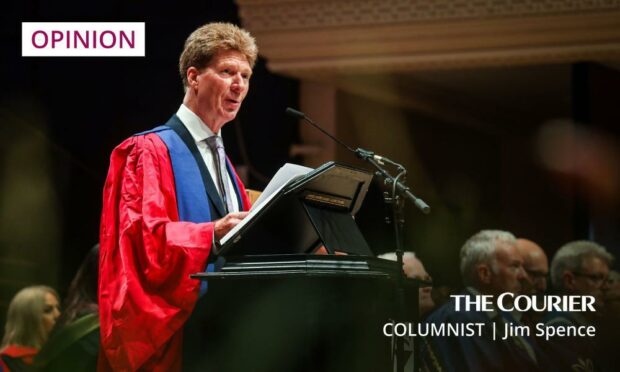We’re sending too many people to university.
We’d be better equipping them for a useful working life with skills which will stand them and society in good stead in future.
I was the first in my family to go to university although I waited until the age of 29 to do so as a mature student.
I had spent the previous five years in the hard physical graft of running a small carrier and removals business.
When you’ve been pinned by the neck in a tight tenement stairwell under an ancient bed settee which has burst loose from its ties and is threatening to choke you against the wall, two hourly lectures a day at uni is a holiday by comparison.

In fairness my law degree opened doors to me, firstly in teaching and then broadcasting, which would otherwise have been closed.
But sometimes I wish that in the words of the song I’d become a Superstar Tradesman.
My problem is that like many folk I’m useless with my hands, as my old tech teacher at Lawside Academy would testify.
My five years there produced a solitary garden trowel of dubious quality.
And my lack of skill has become apparent since we’ve been house renovating recently.
Some of it has been tackled by my wife, who is much more practically skilled in these matters than me, but we’ve had to mainly use trades folk.
Self employed Plumber on Popmaster there saying he’s inundated with work. When I get asked by folk how do I get into journalism I always say……train as a plumber pic.twitter.com/36yYadZ6vB
— Jim Spence (@JimSpenceDundee) September 23, 2021
Some of them get a bad rap, particularly in the new house building game where they’re under immense pressure on time and bonuses.
But we’ve been fortunate in the skills of the trades we’ve employed.
How much use are you in the real world?
Watching a real craftsman or woman in action is sobering for someone like me whose minor talents lie in other areas.
Seeing others working and combining logic and acute manual dexterity leaves me both unsettled and unsatisfied.
I often think if I crash landed on a desert island would I want folk like myself as fellow castaways?
Or would I want joiners, and builders, and chefs, who could provide shelter and sustenance?
Many are posing similar questions as we face the now acute and well publicised shortage of lorry drivers.
As a former Rector of Dundee University it’s great to see young students there and at other institutions setting off on a path in life which will hopefully equip them with the tools for a bright future.
But long before I was elected to that honorary position I was starting to have my doubts about the wisdom of sending so many youngsters on courses of study which would have little or no relevance to the jobs they would end up doing.
My university course was a path to a job
I actually had no intention of studying law and had my mind set on English or politics.
But I heeded the sage words of a mate who’d also studied as a mature student and ended up working as a clerk after his politics degree.
A degree was certainly not a requirement for it and he could have had four years extra earnings in the bank and climbed up the salary and promotion ladder a lot quicker had he gone into his job directly.
Thus, I took the sanguine view that since my wife would be knocking her pan in bringing home the bacon, while subsidising my cushy two lectures a day lifestyle at university, then I should do a degree with a better chance of gainful employment than the one I really fancied.
So I did law and ended up teaching in a further education college, an area which has been scandalously under resourced by comparison to higher education, but which provides students with very worthwhile skills.
Degree snobs degrade value of hard work
Tony Blair is the man responsible for starting the headlong rush to universities, which has left us with shortages of skills in many vital areas.
It was him who set the target of sending 50% of young people into higher education.
That has left us with shortages of skills in many vital areas.
It’s also resulted bluntly in a two tier system of rank snobbery where someone with a degree in whatever subject is ranked above someone without a piece of parchment, irrespective of how useful or useless they turn out to be.
Hard physical work and other skills in a host of other jobs have been too long underappreciated and hugely under valued.
For too long those who’ve performed the absolutely vital tasks of providing essential day to day needs have been underpaid and overworked.
I’m talking about caring for the elderly and disabled or ill, or ensuring that life’s daily necessities are delivered throughout the country.
We’ve placed form before function.
And now we’re failing to function because many of those doing the dirty work are fed up, demoralised, and leaving their jobs.
If we continue to choose the study of Plato over practical plumbing then we’re guaranteed tears from the waterworks when there’s no one left who can fix the kitchen sink when it’s leaking.
JIM SPENCE: M25 protesters won’t win by alienating working people
